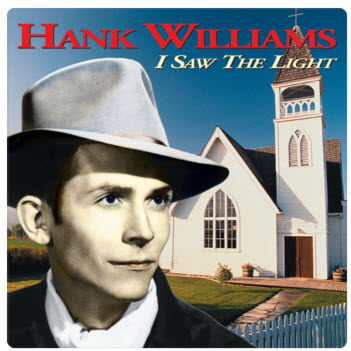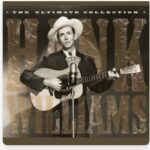Several years in the making, the new compilation The Lost Notebooks of Hank Williams has finally been released. Based upon lyrics that Hank himself completed, with music composed by the various artists involved, this album provides a compelling look into a dark and vengeful side of one of the most important songwriters who ever lived. He’s so well-known as an inspiration to decades of writers and performers that one would think that everything to say about him has already been said; that happily turns out not to be the case as artists as varied in scope as Bob Dylan, Lucinda Williams, Norah Jones, Jack White and Alan Jackson pay tribute to the genius of Hank Williams. The lyrics were found in a briefcase in the back seat of the limousine in which Williams died, so their existence has always been known. Dylan was the first to be contacted about adding music and recording the result; with his participation there was no shortage of musicians who wanted in on the project.
The master of heartbreak and desire, the first truly personal singer-songwriter, Williams died at the age of 29 early in 1953, celebrated for his work and vilified for his personal life and unreliability. He was a compulsive and quick writer, with over 500 compositions in his catalogue. In 2008-2009 fans were treated to two collections of live performances, each consisting of three discs (The Unreleased Recordings) which demonstrated that when he was sober he was a powerful and electrifying showman. Earlier in the decade (2001) the release of Timeless proved his songs to be exactly that in the hands of Bob Dylan, Sheryl Crow, Emmylou Harris, Beck and many more.
The hunger for this man’s music will never abate: he is country music’s Shakespeare and without him the careers of countless writers and singers would be considerably different. Thus, any chance to bring more of his undiscovered work forward meets with great interest: no other artist who has been dead for almost 60 years could command this much rapturous attention on an ongoing basis.
The album opens with Alan Jackson (“You’ve Been Lonesome Too” and concludes with Merle Haggard (“Sermon On The Mount”), two straight-ahead country stars who, while coming on with strong performances, bookend the album with a little too much reverence. Hank’s lyric, though, impresses with its directness: “You’re travelling on the street of grief/ Yes, you’ve been lonesome, too. “Dylan’s “The Love That Faded’, on the other hand, opens things up musically considerably with his gravelly lived-in and world-weary approach that is every bit the equal of his version of “I Can’t Get You Off Of My Mind” that shone on Timeless. Would Williams have gone with a waltz-time approach on this one? – no matter, Dylan is note-perfect on this tune.
Jack White’s take on “You Know That I Know” stands out for its bitterness and candor, as well as the strong melody White has crafted; of all the tunes on this album, this one excels for its outlaw country attitude and superb production values.
“You may fool the rest of this world, but you know that I know.”
The surprisingly hopeful exception to the generally bleak lyrical outlook on the album is Lucinda Williams’s “I’m Happy I Found You”. She’s been singing this in concert for a few years now, and one can’t help but feel her composition generates from the change in her own personal romantic life. It’s a fitting counterpoint and as equally heartfelt as the contributions from the other artists on The Lost Notebooks.




